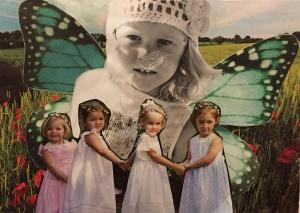
Another guest post from “Sandy” — who was willing to give an interview to Mormon Mental Health about her experience of childhood sexual assault in the context of worthiness interviews (protectldschildren.org). She can use this blog as a platform for as many writings as she would like to post.
This piece includes details that may be upsetting for some to read.
I am honored that I will be wearing Sandy’s charm bracelet with me tomorrow as her proxy during the march. She does an excellent job challenging the delegitimizing that happens when people ask “are these stories even true” or pay less attention when the person has left the church or doesn’t fit the typical markers expected in the culture. This has very much been the case in the Mormon Leaks situation last week.
I can’t. There’s something about a protest, especially a march, where the crowd presses in, and individuals become droplets in a sea of directional movement… Being carried forward by the collective inertial energy, made up of some combination of desire, rage, and adrenaline feels like being caught in a rip tide. It’s too much for my broken nervous system.
I’ve been carrying around a significant amount of guilt about sitting this one out, though. I want to march. I’d carry a banner into this battle, if I could. Not just because of my anger about what happened to me, but because I understand now, as an adult, the nature of my experiences, and what made them possible, and I am profoundly troubled that this is what’s happening to our children, even now.
This week, I happened to read a question directed toward Sam (founder of protectldschildren.org), from someone who wanted to know “Who are these people? Former Mormons with a bone to pick with the church? Or legitimate victims?” I have heard so many people trying to discredit our stories at this point, that I wasn’t remotely surprised at the question. I’m not convinced though, that I’ll ever get used to how painful it is to read words like those.
Today, I’d like to respond to that question, as it applies to me: Yes. I am all of these things.
I say “all” and not “both” because I see having been Mormon as being separate and distinct from having “a bone to pick with the church.” And neither of these descriptors, nor the qualifier of “former” on Mormon, mutually exclude me from being a “legitimate victim.”
I’ll be honest, sometimes I still find myself doubting whether the things I’ve been through were really traumatic enough to justify the pain and sorrow that I grapple with in my life now. The nearly unshakable feeling that when I speak my truth, I’m being selfish, and that I should be able to move beyond these “childish hurt feelings” is deeply, deeply ingrained. Mormonism gave me that. It rings through me as clearly as the song I grew up singing, without fully understanding the implications of the words I knew by heart:
Come, come, ye Saints, no toil nor labor fear;
But with joy wend your way.
Though hard to you this journey may appear,
Grace shall be as your day.
’Tis better far for us to strive
Our useless cares from us to drive;
Do this, and joy your hearts will swell—
All is well! All is well!
Why should we mourn or think our lot is hard?
’Tis not so; all is right.
Why should we think to earn a great reward
If we now shun the fight?
Gird up your loins; fresh courage take.
Our God will never us forsake;
And soon we’ll have this tale to tell—
All is well! All is well!
The voice that echoes in my mind now, that tells me “Why should we mourn? All is well!” attempting to drown out my grief, sounds alarmingly like the voice of my former bishop who sat me in front of him on his bishop’s desk when I was seven years old, put a finger to his lips, a finger to mine, and reminded me that “reverent means quiet” so that I would remain silent when he laid me back on that desk, and had me hold my own ankles as he digitally raped me.
There is a question that Natasha asked during the podcast, that I know she vocalized rhetorically, but that I had, out of necessity, taught myself the answer to, literally, and practically, before I had lost my first baby tooth: “How do you have an orgasm meekly?” The answer is that you clamp your jaw shut, and you hold your breath. A lesson I have yet to unlearn.
So yeah, I’m going to go ahead and say that I have a bone to pick with the church. But you tell me, was I a faithful Mormon? Or was I a legitimate victim? Does the false dichotomy presented by pairing those two questions make you uncomfortable? It does me.
I know that my trauma is not every Mormon’s experience, and I’ll be the first to say that there are beautiful things, gifts that Being Raised Mormon gave me. But as equally as I credit my Mormon upbringing for the gifts I was given, I have to allow myself to place a certain amount of blame there, too.
Do you really think so much less of me for feeling like God DID forsake me in that room? Does the fact that I reclaimed my name from The Church records really invalidate to you the more than twenty years of commitment, and service that I put into being a good Mormon? Does it unmake every loaf of bread that I baked for the sacrament? Does it unvisit every sister I visit taught? Does it unwitness every baptism where I wept with shared joy? Does it unbear every testimony? Unspeak every heartfelt prayer? Unsing every hymn? Unread every scripture? Unteach every Sunday school and Relief Society lesson? Unserve every beloved member of my former ward family? You may believe that I’ve forsaken my covenants, but that doesn’t mean that when I was immersed in the waters of baptism I didn’t get wet.
I have been for my entire life, and still am just as shaped by the Mormon church as you are. Just as reclaiming my name from the records does not undo the damage, or make me less of a “legitimate victim” you also don’t get to say that MY Mormonism doesn’t count. I am a product of the same Mormonism you are. For better and for worse.
Natasha Helfer Parker, LCMFT, CST runs an online practice, Symmetry Solutions, which focuses on helping families and individuals with faith concerns, sexuality and mental health. She hosts the Mormon Mental Health and Mormon Sex Info Podcasts, writes a regular column for Sunstone Magazine, is the current president of the Mormon Mental Health Association and runs a sex education program, Sex Talk with Natasha. She has over 20 years of experience working with primarily an LDS/Mormon clientele.












